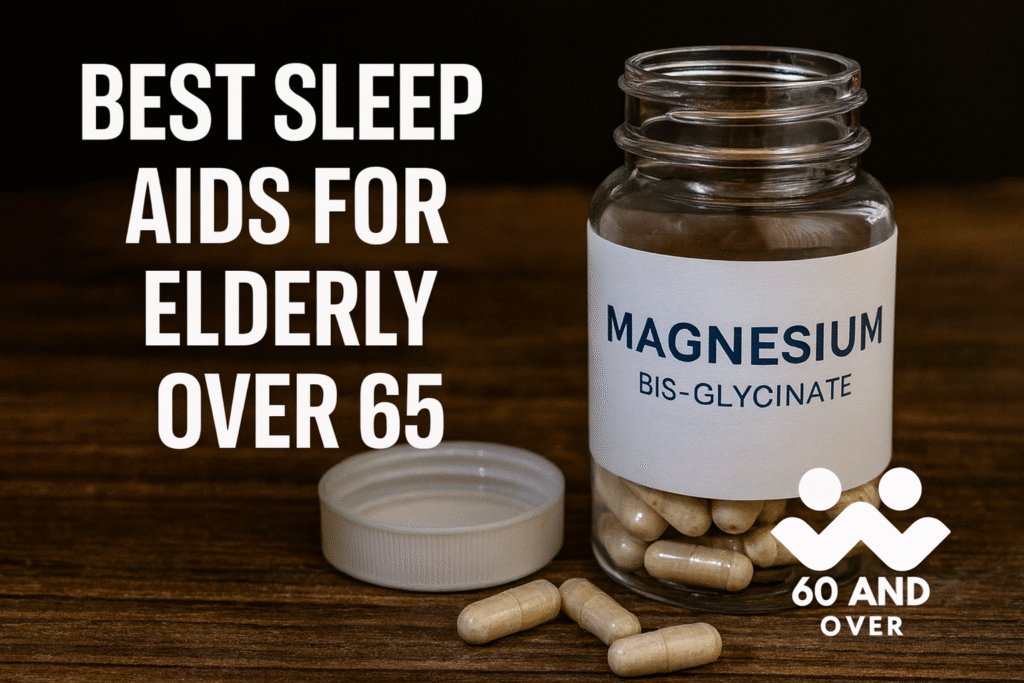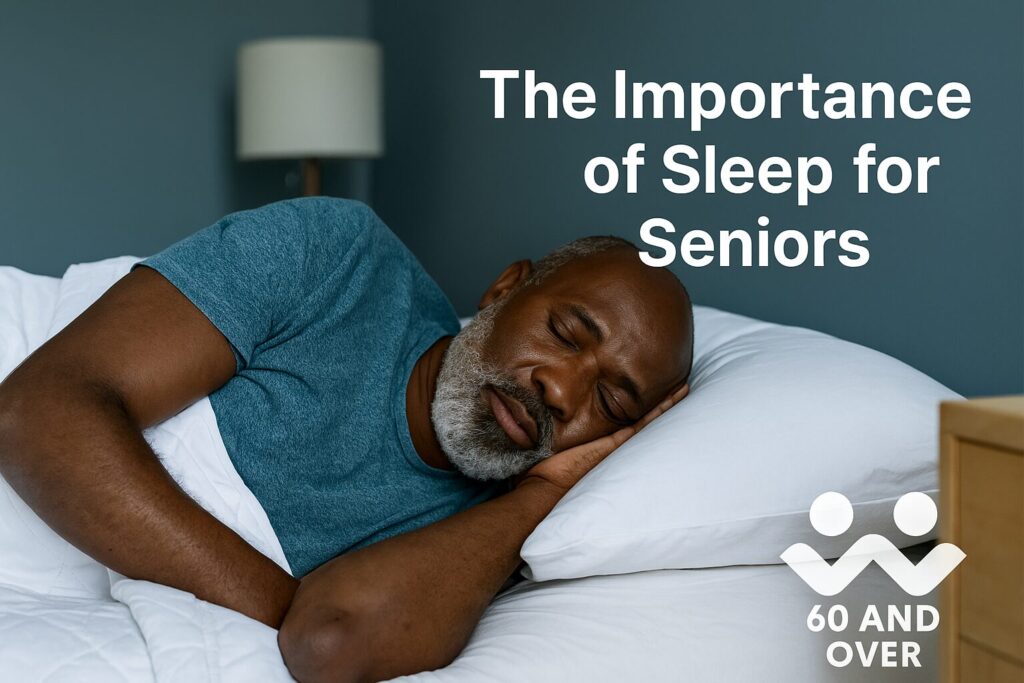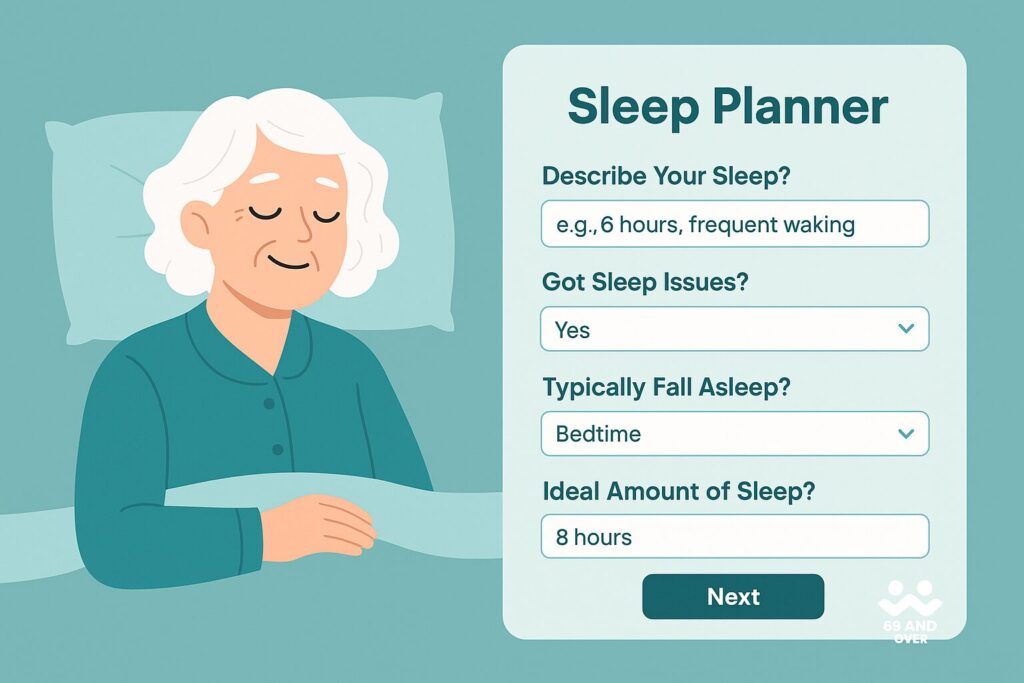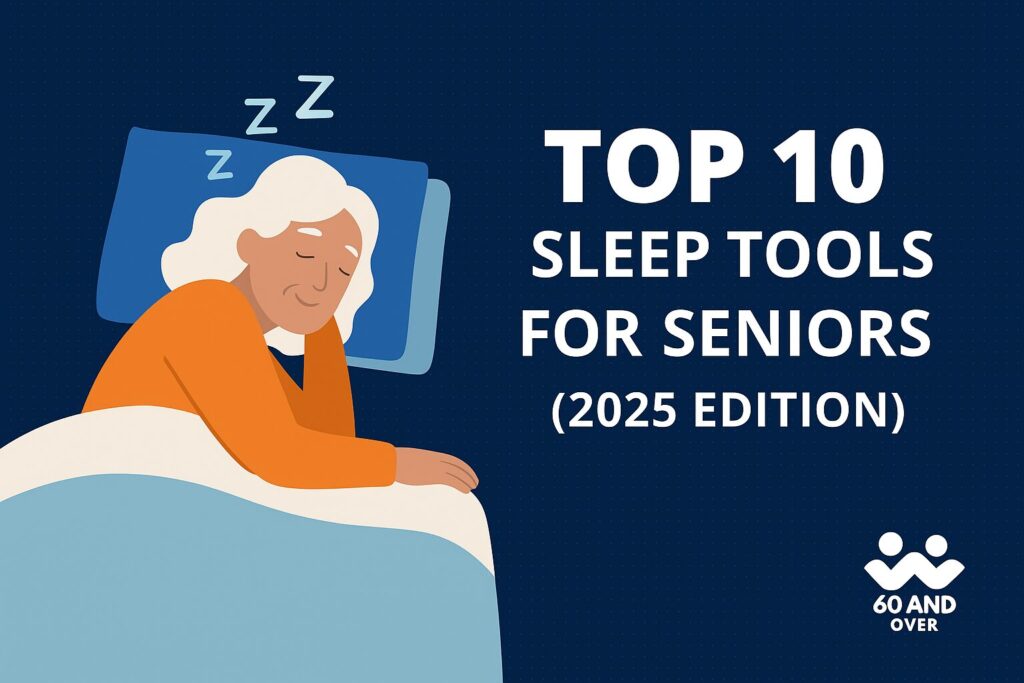Getting a full night’s sleep can feel harder with each passing decade — and for many older adults, that’s not just a feeling, it’s biology. As we move into our mid-60s and beyond, our bodies produce less melatonin, we wake up earlier, and our sleep becomes lighter and easier to disturb. Medications, health conditions, or even nighttime trips to the bathroom can all disrupt what used to be a steady night’s rest.
The good news? There are safe, proven ways to help seniors sleep better — without the confusion, grogginess, or risks that come from stronger sleep drugs. In this comprehensive guide, we’ll explore what really works for older adults, which options to avoid, and how to sleep soundly again with confidence.
- Support Sleep & Calmness* – iMATCHME’s magnesium supplement is expertly crafted with a…
- Complete Wellness in Every Capsule – Elevate your overall well-being with iMATCHME’s…
- Gentle on the Stomach, Easy to Take – iMATCHME’s magnesium glycinate capsules are flavorless,…
- Clean, Trusted Ingredients – Our formula is vegan, non-GMO, and free from soy, gluten, yeast,…
Why Sleep Gets Harder After 65
Aging changes the way the body handles rest. Many seniors notice they fall asleep earlier but wake up too soon, or struggle to stay asleep through the night. According to the National Institute on Aging, roughly half of adults over 65 report frequent insomnia or poor sleep quality.
Several factors contribute to this shift:
- Reduced melatonin production: The hormone responsible for regulating your sleep-wake cycle naturally declines with age.
- Medical conditions: Pain from arthritis, heart disease, restless legs syndrome, or prostate-related nighttime urination can repeatedly wake you up.
- Medications: Blood pressure pills, thyroid medications, antidepressants, and even over-the-counter decongestants can interfere with deep sleep.
- Changes in circadian rhythm: Many older adults experience “advanced sleep phase syndrome,” where their bodies feel ready for bed earlier in the evening but wake up long before dawn.
Understanding these changes is the first step toward choosing the right solution — one that helps without adding new complications.
When to Consider a Sleep Aid
Not every rough night calls for a pill or supplement. Sleep issues can come and go with stress, routine changes, or illness. However, if you’ve been struggling for weeks and poor sleep is affecting your memory, energy, or mood, it may be time to explore gentle sleep support.
The best sleep aid for elderly adults isn’t necessarily the strongest — it’s the safest, simplest option that helps you fall asleep naturally and stay asleep through the night. Always discuss options with a doctor or pharmacist first, especially if you’re taking other medications.
Best Over-the-Counter (OTC) Sleep Aids for Seniors Over 65
When used responsibly, certain OTC sleep aids and natural supplements can support restful nights without major side effects. The key is starting low, going slow, and choosing well-researched products.
🕯️ 1. Controlled-Release Melatonin (0.5–3 mg)
Melatonin is the body’s natural sleep hormone. As we age, levels drop, making it harder to fall asleep or stay asleep. A controlled-release formula (sometimes called extended-release) gradually releases melatonin throughout the night, mimicking your body’s natural rhythm.
- Best for: Difficulty falling or staying asleep.
- When to take: 30–60 minutes before bed.
- Caution: Avoid high doses — more isn’t better. Too much melatonin can cause grogginess or vivid dreams.
Look for USP-certified brands that ensure purity and accuracy of dosage.
- ✔9-in-1 Extra Strength Formula for Rest & Recovery: Struggling with lower-dose melatonin that…
- ✔Fast-Dissolving for Rapid Absorption and Onset: Unlike traditional melatonin products, our…
- ✔Natural Support for Relaxation and Comfort: The herbal blend in this formula works…
- ✔MSM & Magnesium for a Flexible, Comfortable Body: A good night’s rest starts with…
🌿 2. Magnesium Glycinate or Magnesium L-Threonate
Magnesium plays a vital role in calming the nervous system. Deficiency is common in older adults and can contribute to restlessness, muscle cramps, or poor-quality sleep.
- Best for: Muscle relaxation, restless sleep, or mild anxiety at night.
- Dosage: 200–400 mg in the evening (glycinate form is gentler on the stomach).
- Caution: Avoid if you have kidney issues unless cleared by your doctor.
Many seniors find magnesium helps improve sleep quality and reduces nighttime awakenings.
- Heart Health Supplements: This magnesium glycinate capsule activates the enzymes necessary for…
- Energy & Bone Support: Magnesium supports metabolism of carbs and amino acids; supports energy…
- Overall Health & Nutrient Metabolism: This magnesium glycinate supplement helps the metabolism…
- Sleep & Relaxation Aid: Magnesium glycinate may help to support the sleep cycle and aid a sense…
☕ 3. Chamomile Tea or Extract
Chamomile is one of the most traditional, time-tested remedies for mild insomnia. Studies suggest its natural flavonoids can bind to brain receptors that promote relaxation.
- Best for: Trouble winding down, mild stress, or anxiety-related insomnia.
- How to use: A cup of chamomile tea 30 minutes before bedtime or 400–500 mg of extract in capsule form.
- Caution: Avoid if you’re allergic to ragweed or daisies.
Gentle, safe, and effective for light sleep issues.
- SWEET FLORAL FORMULA: Nature’s daisy-like flower is now bottled into a beneficial, liquid…
- POTENT EXTRACT: Horbaach’s Alcohol-Free Liquid Extract is super concentrated for maximum…
- SOOTHING BOTANICALS: Chamomile has been traditionally used to support relaxation and restful…
- HORBAACH MANUFACTURERS: Laboratory Tested, Trusted Ingredients, Superior Quality, 100%…
🌸 4. Lavender (Capsules or Aromatherapy)
Lavender doesn’t just smell nice — it’s clinically proven to promote calmness and improve sleep onset in older adults.
- Best for: Restless nights or difficulty relaxing.
- How to use: Try lavender essential oil in a diffuser, pillow spray, or oral supplement like Silexan.
- Bonus: No sedation or morning fog, making it a senior-friendly choice.
Yes—you can keep this section, but tweak the framing and language so it’s informational (not prescriptive) and avoids any “doctor-approved” vibe. Here’s a tightened, compliance-safe rewrite you can paste in:
- Clinically studied lavender helps reduce tension and stress in this calm supplement.* Supports…
- CalmAid is made with Silexan, a clinically studied lavender oil, to reduce feelings of tension,…
- Adults take 1 softgel once or twice daily with water, easy to swallow and safe for daily use as…
- Softgels are gluten-free calm capsules and contain no salt, wheat, or dairy; contains soy
Prescription Options to Discuss With Your Clinician (Age 65+)
When healthy sleep habits and gentle OTC options aren’t enough, a clinician may consider targeted prescriptions. The goal is to balance potential benefits with safety, especially around morning grogginess, falls, and drug interactions.
💊 Ramelteon (brand: Rozerem)
What it does: Activates melatonin receptors to help signal sleep.
Why it may be considered for older adults: Non-habit forming; low risk of next-day fog for many.
Most helpful for: Trouble falling asleep.
Note: Your clinician will determine if it fits with current meds and conditions.
💊 Low-Dose Doxepin (brand: Silenor)
What it does: At very low doses, blocks histamine receptors to support staying asleep.
Why it may be considered: Minimal next-day sedation at low doses in many patients.
Most helpful for: Middle-of-the-night or early-morning awakenings.
Note: Dosing is individualized; your clinician will set and adjust the dose.
💊 Orexin Receptor Antagonists (e.g., Suvorexant, Lemborexant)
These prescription medications help reduce the brain’s “wake drive,” supporting deeper, more continuous sleep. They’re designed for sleep maintenance without the heavy sedation some older medications cause.
⚠️ Note: Not suitable for everyone (for example, those with liver or respiratory conditions). Always consult your healthcare provider before use.
🔗 Learn more about Orexin receptor antagonists or Suvorexant on MedlinePlus.
💊 Z-Drugs (e.g., Zolpidem/Ambien) — Short-Term, If Used
What they do: Help with falling asleep.
When they’re considered: Short courses at the lowest effective dose when other options are unsuitable.
Important risks: Dizziness, confusion, falls, and rare complex sleep behaviors. Never combine with alcohol or other sedatives.
Friendly safety note: Medications can interact with common 65+ prescriptions (blood pressure, diabetes, anticoagulants, antidepressants). Always review your full medication list with your clinician before starting anything for sleep.
“Sleep needs can change after 65, especially with other medications. Use this overview to guide a conversation with your clinician.”
Sleep Aids to Avoid After 65
Not all sleep aids are safe for seniors. Some common products can do more harm than good.
🚫 Antihistamines (Diphenhydramine, Doxylamine)
Found in products like Benadryl, Tylenol PM, and ZzzQuil, these can cause confusion, dry mouth, constipation, and urinary retention — especially dangerous for older adults.
🚫 Benzodiazepines (Ativan, Valium, Restoril)
While effective short-term, these increase fall risk, memory problems, and dependence. They’re rarely recommended for older adults today.
🚫 Alcohol “Nightcaps”
A drink before bed may make you sleepy, but it fragments deep sleep, dehydrates you, and increases nighttime bathroom trips.
Complementary Sleep Strategies for Seniors
Sleep aids work best when combined with healthy nighttime habits. The following techniques are proven to make any supplement or medication more effective:
- Set a consistent bedtime and wake time — even on weekends.
- Get morning sunlight to strengthen your body clock.
- Keep naps short (under 30 minutes, before 3 p.m.).
- Create a relaxing pre-bed routine — stretching, prayer, reading, or soft music.
- Limit screens and bright light at least an hour before bed.
- Keep your room cool, quiet, and dark.
For chronic insomnia, ask your doctor about Cognitive Behavioral Therapy for Insomnia (CBT-I). It’s one of the most effective, non-drug treatments for lasting sleep improvement.
When to See a Doctor or Sleep Specialist
You should schedule an evaluation if:
- You’ve been using sleep aids regularly for more than two weeks.
- You still feel tired or groggy despite a full night’s rest.
- You wake up gasping, snoring, or choking (possible sleep apnea).
- You experience confusion, dizziness, or falls after taking sleep medications.
A doctor can rule out underlying causes like thyroid imbalance, sleep apnea, chronic pain, or medication side effects. Sometimes adjusting existing prescriptions can improve sleep without adding new ones.
FAQs About Sleep Aids for Seniors Over 65
1. Is melatonin safe for people over 65?
Yes, in low doses (0.5–3 mg), melatonin is considered safe and often beneficial. Always choose controlled-release forms and consult your doctor if you’re on blood pressure or diabetes medication.
2. What’s the safest prescription sleep aid for seniors?
Ramelteon and low-dose doxepin are widely regarded as the safest. They’re non-habit forming and have a low risk of next-day effects.
3. Can I take sleeping pills every night?
It’s best not to. Over time, dependency can build, and natural sleep mechanisms weaken. Aim to combine short-term aid with long-term lifestyle strategies.
4. What sleep aids should I avoid?
Avoid first-generation antihistamines, benzodiazepines, and alcohol-based sleep products. They can cause confusion, balance issues, or worsen chronic conditions.
5. How much sleep do adults over 65 really need?
Most older adults need 7–8 hours of sleep per night, though quality matters more than exact duration.
Best Sleep Aid for Elderly Over 65 — The Bottom Line
There’s no one perfect pill that fits everyone over 65. The best sleep aid is one that helps just enough — without leaving you groggy or at risk of falls. Start with gentle options like melatonin or magnesium, and pair them with steady routines and healthy habits.
If those aren’t enough, talk to your doctor about safe prescription options like ramelteon or low-dose doxepin. They’re medically approved for seniors and balance safety with effectiveness.
And remember — the ultimate goal isn’t dependency on pills, but reclaiming your natural rhythm, rest, and energy for brighter mornings.
🛒 Explore Senior-Friendly Sleep Aids
Looking for trusted options mentioned in this guide?
Visit Amazon to view our handpicked list of senior-safe sleep aids — including gentle melatonin, magnesium, and doctor-approved nighttime support formulas.
As an Amazon Associate, we may earn a commission from qualifying purchases at no extra cost to you. Your support helps us continue creating trusted resources for seniors and caregivers.










